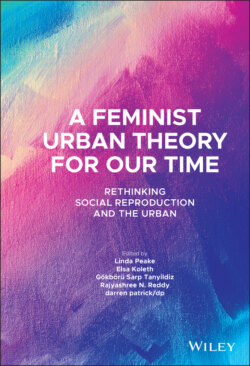Читать книгу A Feminist Urban Theory for Our Time - Группа авторов - Страница 21
The Limits of Social Reproduction
ОглавлениеWhile social reproduction helps us generate deepened analyses of urbanization processes, the formation of the urban, and the lived struggles of urban residents, we recognize, that like all concepts, it has limits, including those we already discussed in relation to the imperatives of decolonizing feminist urban knowledge. As with all attempts to make theoretical sense of worlds in transformation it is wise to be circumspect about the uses of the conceptual frameworks we nurture and to both acknowledge and set our sights beyond their limits. We argue that feminist theory needs to reflect on the limitations of its main concepts and its processes and politics of knowledge production.
One such limitation concerns the collapse of social reproduction into social ontology. Social reproduction eschews the question of social ontology by presenting itself as life-making, the problem being that life is a metaphysical concept, even though it is the most material everyday experience that we all go through. In our view, it is a mistake to think of social reproduction as the production of life itself because such an approach to social reproduction can envelop every possible subject and their everyday struggles into a unitary vision. In this level of universality, it can easily be argued that all people have the same problems (‘we are all in this together’) and require the same solutions. However, this is to push the problem of life not only out of social ontology, but also out of history. In such a scenario, social reproduction is epistemologically operationalized as a false universal appealing to a transhistorical and transgeographical ‘human nature’. Social reproduction then ceases to be a method of investigating and sustaining social ontologies, instead replacing social ontology with itself as life, foreclosing how social reproduction is taken up under different life forms within history.
Amongst the potential pitfalls of such an approach, of making social reproduction a stand-in for life itself, is that of foreclosing appreciation for and engagement with approaches that have deeply rooted political, cosmological, and ontological understandings of and orientations towards the relations that must be sustained in order that life – and not only human life – can thrive. Collapsing these relations into the relations of social reproduction in an anticipation of a unitary framework of analysis stymies the possibilities of reflecting relationally and historically on different forms of violence that render life unliveable for those who are on the receiving end of these violences, as well as for those who directly or indirectly benefit from them.
Moreover, such an approach to social reproduction runs the danger of rendering the social of social reproduction into an index of empirical varieties of oppression, as opposed to having a formational view of it whereby it is not taken for granted but understood in the historicity of its contingent precarity. For instance, slavery, ongoing settler-colonization, and the violence of contemporary capitalism and heteropatriarchy make social reproductive work extremely difficult, for in the aftermath of and during these violent regimes, the social itself needs to be reconstituted. Therefore, as opposed to taking social reproduction as the work that makes all other work possible, an approach that examines what undergirds social reproduction by focusing on the collective re-constitution of the social becomes necessary.
It follows that we need to interrogate the limits of what is signified by the ‘social’ in social reproduction, for example, by probing the anthropocentric conceptualization of social reproduction. The divisions within and between the human and nonhuman that underpin capitalist urbanization (Ruddick 2015) also function to ground an anthropocentrism within frameworks of social reproduction (Andrucki et al. 2018). The following chapters are haunted by organic and inorganic materialities beyond the human, such as water, crops, landscapes, buildings, which, however, largely come into articulation within this volume at the point where they become relevant to human reproduction. In the age of climate crises and viral pandemics, anthropocentric frameworks are increasingly inadequate on their own to either diagnose or respond to the more than non- and more than-human forces and processes that shape futures in and beyond the urban (Meehan and Strauss 2015; McKiethen and Naslund 2017). The current context of changes in the planet’s systems and the role of the urban in those processes has necessitated rethinking of the relationship between social and ecological processes (Derickson 2018b, p. 427; see also Ruddick 2017), including through consideration of multispecies encounters and entanglements across various scales from the microbial to the planetary (Tsing 2015; Leiper 2017).
Reconsidering the limits of what is understood as the social also brings us to the question of the constitutive outside of social reproduction, of questions of undecidability, and of alternative conceptual schemas for understanding the social and the urban that could usefully be brought into conversation (see Peake et al. 2018). Thinking through the historical constitution of social reproduction, its constitutive outsides, and opening up the social may be instrumental in providing insights into how we can think through the possibilities for transformative political action in the midst of crises in social reproduction. While the following chapters, for example, address the potential of social reproduction to create material conditions of life that escape capture by capital, more needs to be done to excavate the revolutionary potential of social reproduction work through commoning practices (cf. Linebaugh 2008) to create what Caffentzis and Federici (2014) refer to as ‘anti-capitalist commons’ and De Angelis and Harvie (2014) as ‘commoning-beyond-capital’.
